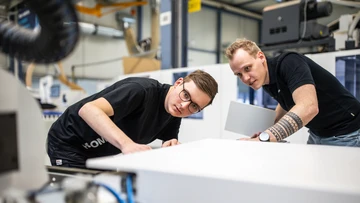“Given the difficult vocational training conditions we have experienced over the last year and a half, these excellent results are a special achievement. The coronavirus pandemic has presented our vocational training facilities with great challenges. This is why we have focused more on digital teaching methods, for instance, to continue offering excellent vocational training to our junior staff. And we have obviously achieved this,” says Klaus Achtelik, Head of HR at the Dürr Group.
A total of 652 companies from all over Germany took part in the Capital study, which is published once a year. The categories analyzed in the study include the support and integration of apprentices within the organization, the use of innovative teaching methods, as well as the percentage of people being offered contracts and the career prospects and opportunities for their further development following completion of vocational training. Another aspect taken into account this year was the extent to which the companies maintained and adapted their vocational training during the pandemic.
In Germany, the Dürr Group currently has around 390 apprentices and cooperative state university students. A good two thirds of them work for HOMAG, world market leader in woodworking machinery. Every year, around 100 young people start their vocational training or their cooperative state university program at the German sites of the Dürr Group. They can choose between 13 apprenticeship programs and 11 cooperative study courses.














